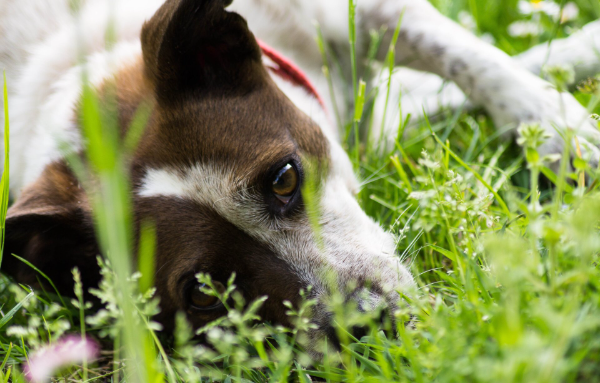Dogs can suffer from food allergies or skin allergies brought on by environmental allergens. There are symptoms for each but often times the symptoms can be across the board:
Types
Skin Allergies:
Skin allergies in dogs is known as allergic dermatitis also known as atopy. Skin allergies present in dogs as “hot spots”, itchy skin, red and swollen skin, and even gastrointestinal symptoms. You may also notice bad texture of its coat or length of its hair, chewing, self-mutilation, gastrointestinal pain, diarrhea, and flatulence. Your dog may even have chronic ear infections with skin allergies. Some breeds of dog are more susceptible to developing skin allergies. These breeds include: bulldogs, labrador retrievers, golden retrievers, and terriers.
The most common types of skin allergies are:
- Flea bite dermatitis: Flea bite allergies are caused by and allergic reaction to the saliva of a flea bite. You may see red, itchy skin at the base of the dog’s tail as well as flea dirt or actual fleas. Flea allergies are the most common type of allergies in dogs. You may notice your dog licking and biting a certain area.
- Food allergies: Food allergies are actually quite uncommon in dogs. They traditionally only account for approximately 10% of all allergies in dogs. Dogs can immediately be allergic to certain foods and ingredients or these allergies can develop over time. The most common culprits of food allergies in dog are soy, wheat, lamb, beef, and chicken. While the most common symptoms of a food allergy are itchy skin and gastrointestinal, some dogs may also exhibit lack of energy or hyperactivity, weight loss, and aggression.
- Environmental allergens: Dogs can be allergic to many different substances in the environment such as pollen, grass, mold spores, dust mites, and soil.
Food Allergies:
Dogs who suffer with food allergies will suffer similar symptoms as skin allergy symptoms but the itching will be more localized to the ears and paws. They can also get hives and swelling around the mouth much like humans. Food allergies also cause our four legged friends gastrointestinal problems such as vomiting and diarrhea.
Testing
It can be difficult to diagnose what type of allergies your dog may suffer from due to the symptoms being similar for all three types of allergies. If your dog displays these symptoms, a vet will need to perform allergy tests to be sure of what is going on with your pup. There are two types of tests a vet may use: intradermal skin testing or RAST testing.
Intradermal Skin Testing:
This test is considered the top type of testing to find out what is going on with your pup. While great results are achieved with this test, the procedure is a bit cumbersome. Only a vet dermatologist can perform the test and your dog has to be placed under anesthesia. A large portion of your dog’s coat has to be shaved to allow the reactions to show up and be detectable.
Radioallergosorbent Test (RAST):
RAST testing only requires a single vial of blood from your pet and can be done at a regular visit with your vet. The RAST test is not as reliable as the Intradermal testing, giving a high incidence of false positives but even when treated after, the dogs have received relief from many of their symptoms.
Treatment
For flea bite allergies, it is important that your dog is on a safe and effective flea treatment to avoid fleas altogether. Other treatments you can use to help your itchy pooch who suffers frm skin allergies and environmental allergens are:
- Antibiotics
- Antifungals
- Antihistamines
- Hypoallergenic Vaccinations
- Allergy Immune Supplements and Probiotics
- Immunotherapy
- Medicated Baths
- Referral to a vet dermatologist
- Omega 3 Fatty Acids
- Skin Ointments and Creams
- Steroids
- Use Grooming Wipes to wipe Paws and Belly after Being Outside
There are many home remedies that people with pets who have allergies rely on. Before using any treatment for your dog, you should always contact your vet prior to trying. These home remedies include:
- Probiotics
- Apple Cider Vinegar
- Coconut Oil
- Antioxidant rich foods such as pumpkin, broccoli, kale, and blueberries
- Homemade allergen spray
For food allergies, you may need to give your dog a special hypoallergenic diet or find out exactly what food or ingredients bother your pup and eliminate those out of their diet. One thing to look for when your dog is diagnosed with a food allergy is that they can then become allergic to other foods as well or develop skin allergies too.







